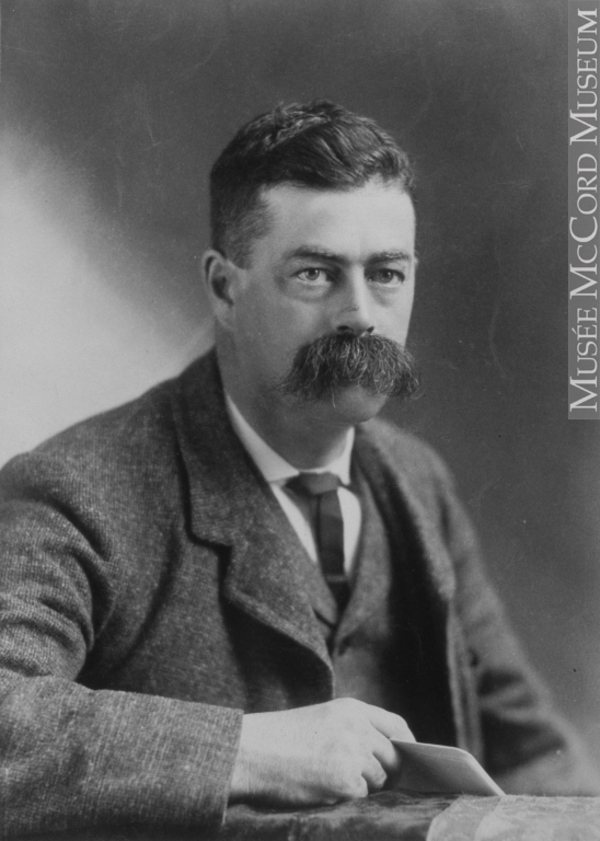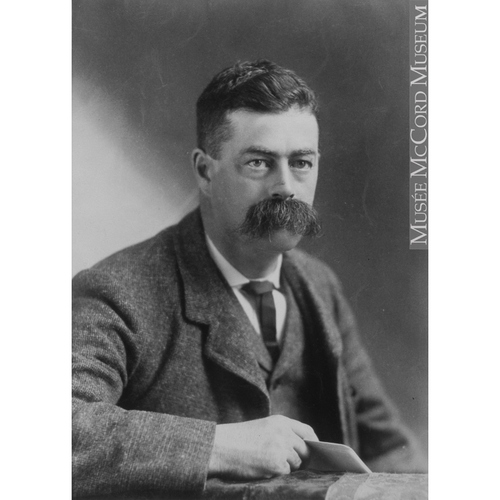
Source: Link
STEWART, GEORGE, editor, publisher, pharmacist, and author; b. 26 Nov. 1848 in New York City, only child of George Stewart and Elizabeth Dubuc; m. 28 April 1875 in Saint John, N.B., Maggie M. Jewett, adopted daughter of a local lumberman and shipbuilder; d. 27 Feb. 1906 in Quebec City.
In 1851 the Stewart family moved from New York to London, Upper Canada, where George Stewart Sr managed a fur and leather business for his father-in-law, Pascal Dubuc. Then in 1859 the family settled in Saint John. Stewart Sr opened a furniture store and worked as an auctioneer. George Stewart Jr attended the Saint John Grammar School for three years and in 1863 he was apprenticed to pharmacist William O. Smith. At age 16, Stewart inaugurated the Stamp Collector’s Monthly Gazette in June 1865 as an outlet for his stamp dealer’s business. The magazine, an eclectic mixture of philately, political comment, local fiction, and poetry, was gradually revised to appeal to general readers, and gives evidence of Stewart’s early interest in developing a platform for Canadian writing.
The Stamp Collector’s Monthly Gazette lasted two years. Stewart followed it with Stewart’s Literary Quarterly Magazine, a periodical celebrating confederation and publishing only Canadian authors. Maintained almost exclusively by its young editor, the Quarterly earned Stewart a lasting reputation among Canadian men of letters. It is a testament both to his faith in Canada and to the central role he played in shaping the country’s cultural identity. The magazine published many of the cultural arbiters of later-19th-century Canada and Newfoundland, among them Thomas D’Arcy McGee*, James MacPherson Le Moine*, John George Bourinot, Charles Sangster*, Alexander McLachlan*, Evan MacColl*, William Lyall*, Moses Harvey, and Daniel Clark*, the last three Presbyterian adherents of the Scottish common sense philosophy. Stewart countered the parochialism of their English Canadian focus by including a number of reviews of French Canadian literature, by praising François-Xavier Garneau*’s History of Canada . . . (translated into English in 1860) as a work of rare ability, and by publishing Le Moine’s memoir of Garneau, which included a long quotation from the History on the importance of preserving the French Canadian national spirit.
On the demise of the Quarterly in 1872, Stewart turned his attention to his pharmacy which had opened the previous year, promoting it in local newspapers with a series of witty verse parodies of popular advertisements, and building up a prosperous trade. During the years that followed he worked as a part-time journalist, from 1871 to 1875 as city editor for the Saint John Daily News and from 1875 to 1877 as an outspoken literary and drama reviewer for the Saint John Watchman. Early in 1877 he produced a book of essays on Thomas Carlyle and writers from New England; Evenings in the library: bits of gossip about books and those who write them was published by Belford Brothers in Toronto [see Charles Belford*]. After a massive fire swept through Saint John that year Belford Brothers brought out Stewart’s The story of the great fire in St. John, N.B., June 20th, 1877, a book that reportedly sold 10,000 copies and helped Stewart recoup the loss of both his house and his pharmacy.
Stewart moved to Toronto in May 1878 to become editor of Rose-Belford’s Canadian Monthly and National Review for the Belfords and George Maclean Rose*. His association with Belford Brothers ended abruptly, however, when they refused him royalties on his collection of the speeches of Lord Dufferin [Blackwood], Canada under the administration of the Earl of Dufferin, published that year. He sued the Belfords but lost his case on the grounds that he had written the book in his capacity as editor of the magazine.
With a growing family to support, Stewart moved once more, in 1879, to become editor of the Morning Chronicle in Quebec City, where he remained until 1896. He continued to publish essays and lectures and to chart the course of Canadian literature, promoting its French and English authors in American, British, and Canadian periodicals. During the 1880s he also contributed to various reference works; he wrote biographies of prominent Canadians for John Charles Dent*’s Canadian portrait gallery (Toronto, 1880–81) and Appletons’ cyclopædia of American biography (New York, 1887–1924), as well as articles on Quebec and the Maritimes for the ninth edition of the Encyclopædia Britannica. He was nominated a founding member of the Royal Society of Canada in 1882, acted as secretary of its section on English literature for nearly 20 years, and served as president of the Literary and Historical Society of Quebec from 1885 to 1891. In the fall of 1884 he and his wife undertook a literary pilgrimage to the British Isles. Made an honorary member of the Athenaeum Club in London through the courtesy of British author Matthew Arnold (who had been his guest while lecturing in Canada the previous winter) and armed with letters of introduction obtained from American and Canadian literary friends, Stewart met most of the literary lions of the day and added to his name at home as a man of letters. In 1885 he became the first English Canadian writer to be given an honorary degree for service to Canadian letters. His dcl from King’s College, Windsor, N.S., was followed by honorary degrees from the Université Laval (1888), Bishop’s College (1888), and McGill University (1889).
Journalism was a precarious career in 19th-century Canada. Stewart left the Morning Chronicle when it changed hands and in 1898 he bought the Quebec Daily Mercury, giving up much of his freelance writing and devoting most of his energies to the newspaper. He was unable to compete with a restructured and modernized Chronicle, however. The Mercury was failing in 1902 when he sold it to L.-J. Tarte et Frère of Montreal, proprietors of La Patrie. Stewart remained as an editor until the newspaper’s disappearance in 1903, when he returned to the Morning Chronicle as night editor. He worked with the Chronicle until his death, two months after that of his wife, who had died suddenly of pneumonia on Christmas Day 1905. A coroner’s report states that Stewart died of cerebral apoplexy, but two obituaries in Quebec City newspapers suggest that he may have died of grief. His letters, stamps, and books were sold to pay creditors. His dream of living by and for good literature had foundered in a society more interested in commerce than in culture.
The author’s article “George Stewart, Jr., a nineteenth-century Canadian man of letters,” BSC Papers, 25 (1986): 82–108, includes a detailed list of Stewart’s publications (books and monographs, articles, reviews, and short stories), the lectures he gave, the journals he published, and the newspapers he worked for; it also lists repositories which hold unpublished papers.
Mount Allison Univ. Library (Sackville, N.B.), Special Coll., Winthrop Pickard Bell Coll. of Acadiana, George Stewart scrapbooks, 1–40. MTRL, George Stewart papers. Daily Telegraph (Quebec), 26 Feb. 1906. Moncton Times (Moncton, N.B.), 30 April 1878. Montreal Daily Herald, 27 Feb. 1906. Quebec Chronicle, 27 Feb. 1906. Canadian men and women of the time (Morgan; 1898). Directory, London, Ont., 1856. Vital statistics from N.B. newspapers, 1875 (Johnson), nos.689–90.
Cite This Article
Carol W. Fullerton, “STEWART, GEORGE,” in Dictionary of Canadian Biography, vol. 13, University of Toronto/Université Laval, 2003–, accessed February 28, 2026, https://www.biographi.ca/en/bio/stewart_george_13E.html.
The citation above shows the format for footnotes and endnotes according to the Chicago manual of style (16th edition). Information to be used in other citation formats:
| Permalink: | https://www.biographi.ca/en/bio/stewart_george_13E.html |
| Author of Article: | Carol W. Fullerton |
| Title of Article: | STEWART, GEORGE |
| Publication Name: | Dictionary of Canadian Biography, vol. 13 |
| Publisher: | University of Toronto/Université Laval |
| Year of publication: | 1994 |
| Year of revision: | 1994 |
| Access Date: | February 28, 2026 |



